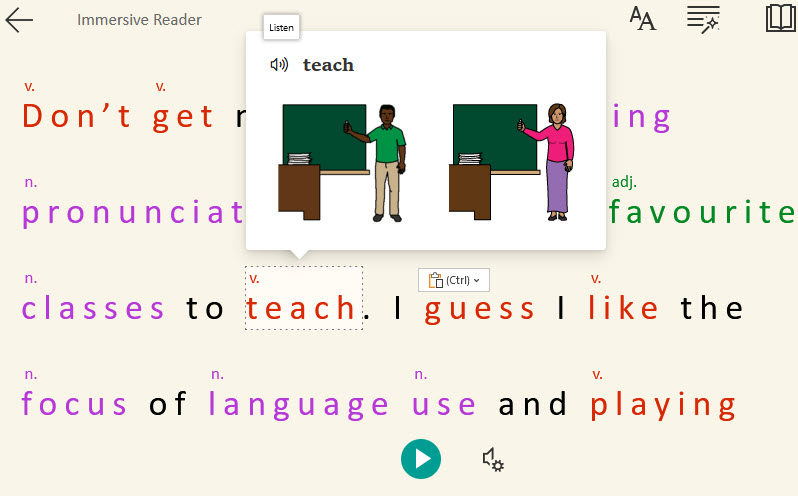Learners often come to me with questions about their English reading materials. They wonder if the books they’ve chosen are good for practicing English or why certain expressions differ from what they hear daily. For instance, one of my students asked why “you shall” was used in a text. This highlighted a common issue: many learners struggle to distinguish between reading for pleasure and reading to learn English as a second language. This leads to a vital question: How does one choose a book that benefits English learning? However, selecting the right materials involves more than just finding any English text—it requires careful consideration of the learner’s proficiency level and the regional variation of English they are exposed to.
Continue readingCategory Archives: Reading
April is Poetry Month
 Remember poetry? Do you ever find opportunities to use it in your English instruction? This April marks the 25th anniversary of national poetry month. We hope you enjoy this selection of previous blogs about poetry from TESL Ontario Blog.
Remember poetry? Do you ever find opportunities to use it in your English instruction? This April marks the 25th anniversary of national poetry month. We hope you enjoy this selection of previous blogs about poetry from TESL Ontario Blog.
“If you wanted a poem, you only had to look out of a window. There was material always, walking or running, fighting or screaming or singing.” Gwendolyn Brooks, African-American poet and Pulitzer Prize-winning author of Annie Allen.
Immersive Reader for Autonomous Reading Practice
Introduction
In 2018, Beth Beardall posted that reading advances learner grammar comprehension, vocabulary, writing skills, critical thinking skills and speaking fluency in the post Reading, Reading, Reading. Why it is so important! One way to assist your learners with reading is to encourage them to use the Microsoft Immersive Reader tool.
Continue readingPersonal Learning Styles and Reading Skills
In this blog post, I’d like to point out the importance of taking learners’ personal learning styles into account when they are asked to do a reading task. This idea is interesting for me personally because I think not all the techniques and strategies which exist to help us do a particular task can work for all in the same way.
Continue readingMoving Forward with Extensive Reading in the LINC Context
In 2014, I posted on the TESL Ontario blog “Encourage Extensive Reading with MReader.” Since then, I have been integrating extensive reading with language learners in different contexts. I have learned a great deal using extensive reading in face-to-face situations. However, as COVID has forced us all online, the new challenge is facilitating extensive reading in a fully online mode.
In late 2021, Sepideh Alavi, a member of the Extensive Reading Foundation Board of Directors and Avenue mentor, and I started an extensive reading research project on the Avenue system. A critical part of this study is a pilot test of extensive reading with literacy-level classes.
Continue readingStudents in Charge: Ideas for Reading and Listening Activities
Recently, I did a small experiment with my students. Instead of me assigning reading and listening tasks, I asked them to read an article and watch a YouTube video, and then make their own questions as if they were teachers. The results and feedback were quite astonishing.
Continue readingEnhancing Reading Comprehension II: Structured Experience Techniques
The key feature of structured experience techniques is their combination of hands-on learner involvement, with a reassuring framework to reduce anxiety and promote active engagement. The trick is to provide supportive, structural guidance without lapsing into full-on, direct instruction. For comparison purposes, it might be helpful to begin by reviewing my earlier suggestions in ‘Enhancing Reading Comprehension I: Explicit Teaching Techniques.’ Structured experience strategies require teachers to gauge their own participation very carefully. The goal is not only to enhance learner skills but also to bolster their self-esteem through encountering success with experiential activity.
Continue readingEnhancing Reading Comprehension I: Explicit Teaching Techniques

Reading can be a very challenging skill for ESL learners. Teachers also know that individual students may respond differently to different styles of instruction. Fortunately, we have access to both explicit teaching techniques and structured experience techniques. Even though ESL teachers themselves may be more comfortable with one or the other of these options, it is well worth taking both of them seriously because each can make a contribution. Part I of this series covers explicit teaching techniques and Part II covers structured experience techniques. I will offer practical advice regarding both approaches, and explain three proposed techniques for each.
Continue readingSummary of the #English Language Skills discussion with Cecilia Aponte-de-Hanna, OCELT
Post by: Cecilia Aponte-de-Hanna and Vanessa Nino
On April 30, 2021 people in the TESL Ontario community discussed teaching the English language skills on Twitter. The guest moderator of the evening was Cecilia Aponte-de-Hanna (@capontedehanna). Cecilia is a full-time professor at Centennial College, where she teaches English communications courses to local and international students. With over 15 years of teaching experience, Cecilia has taught children as young as 3 years old to adults in their golden years.
Continue readingPut Your Reading Socks On!
A Perfect Time to Read
“Books are a uniquely portable magic,” as Stephen King wrote, so spend the rest of this pandemic with your reading socks on! It is a stressful time; reading a good book or an educational article can be extremely therapeutic!
In this blog entry, I will briefly review some professional articles and Canadian books I think you might enjoy. I would love an exchange of ideas if you read or have already read some of my suggestions listed below.
Continue reading







